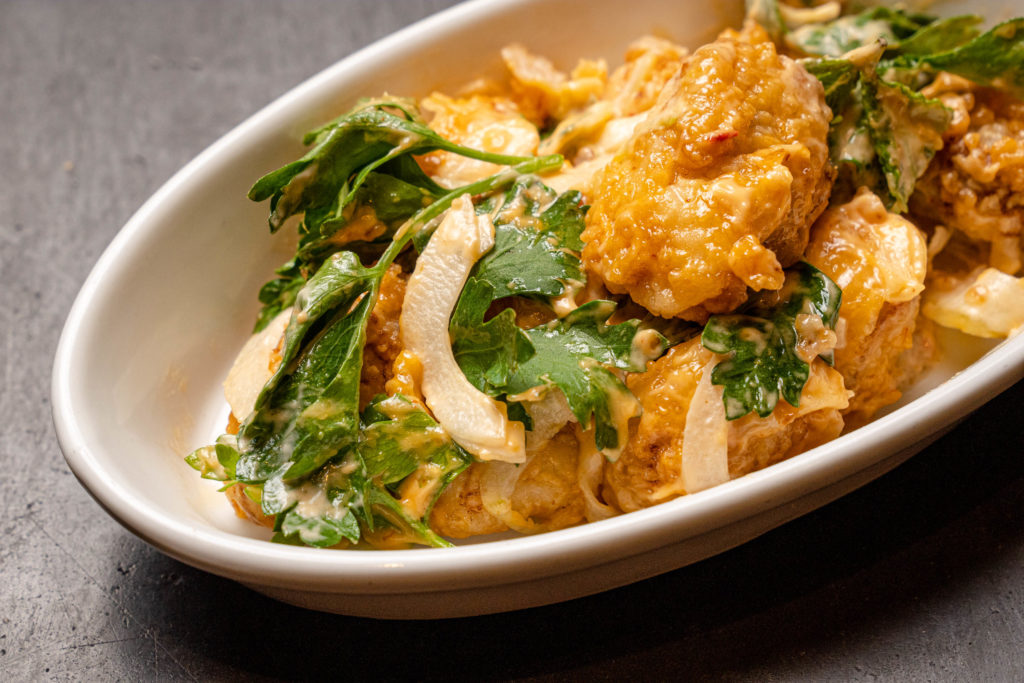The New Orleans’ dining scene sizzles with alligator dishes, mouthwatering bites that capture the essence of Louisiana’s culinary tradition.
The American alligator, fondly referred to as a “gator”, is a large reptile native to the southeast United States. Their dark gray or greenish black skin is armored in bony plates, and a gator’s large, powerful jaw filled with sharp teeth has a measured bite force of 2000 pounds per square inch. On average, adult alligators grow to about 14 feet long and weigh about 500 lbs. They first appeared in the Cretaceous period, about 145-66 million years ago, and managed to survive a meteoric extinction event that wiped out the dinosaurs.
Alligators can be found from Texas eastward to North Carolina, but Louisiana and Florida have the largest populations with more than a million wild gators per state, but their numbers haven’t always been this robust. In 1967 the American alligator was listed under the Endangered Species Act after being hunted to near extinction. Luckily, gators made a dramatic recovery and were removed from the list in 1987. In fact, gator re-population has been so successful, wild Louisiana alligators can be hunted, but only by licensed residents lucky enough to win the lottery for alligator harvest during the two-month-long seasons strictly regulated by the state wildlife agency.
For centuries, people have been hunting and eating American alligators, from Native American tribes such as the Chitimacha who lived in Louisiana around Grand Lake, to the Acadians or Cajuns who migrated to the area in the mid-1700s. Alligator meat is high in protein and very low in fat — lower than chicken, beef, or pork — and though the choicest cuts come from their powerful tails and jaws, the tougher meat on the body and legs are also good eats. It just requires a little extra preparation.
Unless you’re eating wild-caught gator gumbo in Boudreaux’s kitchen, most of the alligator meat on the market, or prepared in restaurants, is farm-raised. Though certain animal rights groups believe it to be inhumane, it’s hard to ignore facts pointing to alligator farming’s sustainability, as it is easier and measurably safer for the environment than raising pork or cattle. Gator farms also have direct, positive effects on conservation; the luxury goods industry gets a reliable stream of product which reduces illegal poaching; and juvenile alligators are regularly released into the wild to support a steady population.
Because of its low-fat, high-protein appeal, alligator meat has become more popular than ever before, an industry that brings in more than $10 million per year to Louisiana alone. If you’ve never eaten alligator meat, the old cliché “it tastes like chicken” actually fits, as it has a mild flavor that’s just slightly fishy, and a bit chewier texture. Gator can be prepared in a multitude of different recipes, but it’s frequently minced and mixed with pork to make sausage, or seasoned and stuffed into casings with cooked rice to make boudin.

If you’re visiting New Orleans and want to get your first bite, there are restaurants all across the city with their own unique gator dishes to try. One of the most common preparations are fried alligator bites, kind of like chicken nuggets with an array of different sauces; from remoulade to Ranch. At Cochon Restaurant on Tchoupitoulas Street in the Warehouse District, James Beard Award-winning chef and co-owner Steven Stryjewski created his own version of this Cajun classic. Alligator tenderloin is cut into chunks, seasoned with salt and pepper, and repeatedly coated in flour and cornstarch after a dip in buttermilk. The chunks are then deep fried, seasoned with chopped mint and parsley, and tossed in a chili garlic mayo.
In the historic French Quarter at the Original Pierre Maspero’s on Chartres Street, you can also get a taste of fried gator, only they serve it in strips with mirliton slaw and “gator sauce” . . . but might we recommend breakfast? Along with chicken and waffles, and pain perdu, diners can enjoy a Cajun, 3-egg omelet with alligator sausage, grilled onions, bell peppers, and smothered in a Tabasco hollandaise.

On the other side of Jackson Square from Maspero’s, located in a Creole townhouse on St. Philip Street, MRB Bar & Kitchen has taken gator to glorious new heights. Along with chargrilled oysters and a cooling Pimm’s Cup, this chill watering hole with live music in an enclosed courtyard offers a Chicken Fried Alligator sandwich with crisp coleslaw and Thai chili sauce on a soft, ciabatta bun.
Over in Bayou St. John, the uber-popular, century-old Parkway Bakery & Tavern offers its own taste of gator. As is only right, the neighborhood spot features a smoked alligator sausage po-boy on soft, Leidenheimer bread. We suggest you get your gator po-boy fully dressed – ie. with lettuce, tomato, mayo and pickles – with a side of house made red potato salad, or a bag of Zapp’s Cajun Crawtator Potato Chips.

Poydras & Peters, an upscale restaurant inside the Loew’s Hotel has their own unique dish of our beloved swamp dinosaur. Chef Jason Schwartz has created a delicate appetizer of blackened alligator served with sun-dried tomato pesto atop a still pool of buttery Hollandaise. Along with an entree of herb-crusted drum, and pillowy beignets for dessert, it promises to be a most memorable meal.
Regardless of which location you visit, gator is good at Dat Dog, New Orleans’s most colorful wiener joint. Dat Dog specializes in sausages of all kinds, with multitudes of varied toppings, from all-beef Vienna and crawfish, to smoked and vegan bratwurst, but do not miss their rajun’ Rougarou. It’s a massive dog made of alligator sausage and loaded with grilled onions, jalapenos, tomatoes, Creole mustard, barbecue sauce and (of course) bacon. If the Rougarou doesn’t get you, create your own gator dog, just be sure to add an order of tater tots on the side, and be doubly sure to smother it in crawfish etoufee.
Finally, one of the easiest ways to snap up a taste of alligator is while shopping at the French Market. For over two centuries, this district has been a center of commerce, one that’s been destroyed and rebuilt many times over. While browsing for unique souvenirs – everything from hot sauce and seasonings to jewelry, apparel, and art – stop at the World Famous N’awlins Cafe & Spice Emporium for a spicy alligator sausage “kabob” on a stick.
*Article originally published in the June 2024 issue of Where Y’at Magazine



